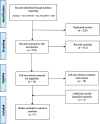Attitudes of physicians, nurses, and the general public toward End-of-Life (EoL) decisions in European countries: an umbrella review
- PMID: 40346520
- PMCID: PMC12063369
- DOI: 10.1186/s12910-025-01219-z
Attitudes of physicians, nurses, and the general public toward End-of-Life (EoL) decisions in European countries: an umbrella review
Abstract
Background: End-of-life (EoL) decisions represent some of the most ethically complex and emotionally charged aspects of healthcare. Understanding the attitudes of physicians, nurses, and the public toward EoL decisions is crucial for aligning care provided with the personal values and preferences of patients.
Aim: To explore the attitudes of physicians, nurses, and the general public toward EoL decisions, including the withdrawal or withholding of life-sustaining treatments, euthanasia, physician-assisted suicide (PAS), palliative sedation, and advance care planning (ACP) within European countries.
Design: An umbrella review was conducted, covering the period from January 2010 to June 2024. The search strategy included Medline, CINAHL, and PsycINFO, supplemented by manual searches of reference lists of all included studies to identify additional relevant studies.
Results: The search identified 587 papers, 11 of which were included in the synthesis. Of these, six addressed euthanasia and PAS, three focused on ACP, one on the withdrawal of life-sustaining treatments, and one on palliative sedation. In Europe, the general public expressed the highest level of support for EoL practices such as euthanasia and PAS, followed by nurses, while physicians often held a more cautious perspective. For withdrawal of treatment, palliative sedation, and ACP, a critical recurring theme was the need to improve communication between patients and healthcare professionals.
Conclusions: The divergence underscores the intricate complexity of navigating ethical, cultural, and professional considerations in EoL care. Effective communication serves as a cornerstone for respecting patient autonomy and ensuring that healthcare decisions align with individual values, goals and preferences.
Keywords: Advance care planning (ACP); Attitude; End-of-life (EoL) decision; Euthanasia; Palliative sedation; Physician-assisted suicide (PAS); Withdrawal of treatment.
© 2025. The Author(s).
Conflict of interest statement
Declarations. Ethics approval and consent to participate: Not applicable. Consent for publication: Not applicable. Competing interests: The authors declare no competing interests.
Figures
References
-
- Eagly AH, Chaiken S. The psychology of attitudes. New York: Harcourt, Brace, & Janovich; 1993.
-
- Bergman MM. A theoretical note on the differences between attitudes, opinions, and values. Swiss Political Science Review. 1998;2(4):81–93. - DOI
Publication types
MeSH terms
Grants and funding
- 2022XSS48C/This research was funded by the ELISI (Attitudes towards End-of-Life Issues in Italy) project (https://www.elisiproject.it/), supported by the European Union (NextGenerationEU) and the Italian Ministry of University and Research
- 2022XSS48C/This research was funded by the ELISI (Attitudes towards End-of-Life Issues in Italy) project (https://www.elisiproject.it/), supported by the European Union (NextGenerationEU) and the Italian Ministry of University and Research
- 2022XSS48C/This research was funded by the ELISI (Attitudes towards End-of-Life Issues in Italy) project (https://www.elisiproject.it/), supported by the European Union (NextGenerationEU) and the Italian Ministry of University and Research
- 2022XSS48C/This research was funded by the ELISI (Attitudes towards End-of-Life Issues in Italy) project (https://www.elisiproject.it/), supported by the European Union (NextGenerationEU) and the Italian Ministry of University and Research
- 2022XSS48C/This research was funded by the ELISI (Attitudes towards End-of-Life Issues in Italy) project (https://www.elisiproject.it/), supported by the European Union (NextGenerationEU) and the Italian Ministry of University and Research
- 2022XSS48C/This research was funded by the ELISI (Attitudes towards End-of-Life Issues in Italy) project (https://www.elisiproject.it/), supported by the European Union (NextGenerationEU) and the Italian Ministry of University and Research
- 2022XSS48C/This research was funded by the ELISI (Attitudes towards End-of-Life Issues in Italy) project (https://www.elisiproject.it/), supported by the European Union (NextGenerationEU) and the Italian Ministry of University and Research
- 2022XSS48C/This research was funded by the ELISI (Attitudes towards End-of-Life Issues in Italy) project (https://www.elisiproject.it/), supported by the European Union (NextGenerationEU) and the Italian Ministry of University and Research
- 2022XSS48C/This research was funded by the ELISI (Attitudes towards End-of-Life Issues in Italy) project (https://www.elisiproject.it/), supported by the European Union (NextGenerationEU) and the Italian Ministry of University and Research
- 2022XSS48C/This research was funded by the ELISI (Attitudes towards End-of-Life Issues in Italy) project (https://www.elisiproject.it/), supported by the European Union (NextGenerationEU) and the Italian Ministry of University and Research
- 2022XSS48C/This research was funded by the ELISI (Attitudes towards End-of-Life Issues in Italy) project (https://www.elisiproject.it/), supported by the European Union (NextGenerationEU) and the Italian Ministry of University and Research
- 2022XSS48C/This research was funded by the ELISI (Attitudes towards End-of-Life Issues in Italy) project (https://www.elisiproject.it/), supported by the European Union (NextGenerationEU) and the Italian Ministry of University and Research
LinkOut - more resources
Full Text Sources


